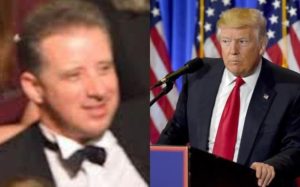by WorldTribune Staff, January 13, 2017
The “dodgy” dossier on President-elect Donald Trump allegedly compiled by a former British agent reads more like a spy novel than an intelligence document, media critics said.
The latest Trump “narrative” wasn’t that big of a secret. It had been shopped around to multiple news outlets including big names like The Washington Post, The New York Times, Politico and McClatchy. None were able to confirm the contents of the “secret dossier.”

“Throughout the dossier there are no caveats. No pulling together of information; no effort to consider the material as a whole. The ‘product’ is certainly not finished intelligence,” Jamie Dettmer, an international correspondent covering Europe and the Middle East for VOA, wrote in a Jan. 12 column for The Hill.
Baroness Neville-Jones, the former head of Britain’s Joint Intelligence Committee and the minister of state for security and counterterrorism in David Cameron’s government, stressed in remarks to Sky News that the dossier is “a piece of private enterprise by a former member of the service. It does not have the standard of something produced by an agency.”
The onetime spy in question, Christopher Steele, “has gone to ground, fleeing his home outside London for fear of Kremlin reprisals,” according to Britain’s Daily Telegraph.
One of the big questions hanging over Steele’s probe into Trump, Dettmer said, is how good and relevant Steele’s own sources are in Russia now. “He has long been gone from Moscow and many of his Russian intelligence sources are likely to have retired.”
“Is what he picked up the gossip of former Russian officials and intelligence officers? If so, their testimony is less relevant than current officials and spooks and to make contact with active intelligence officials is much harder now than it was when he was working for MI6 in the Russian capital,” Dettmer wrote.
According to Oliver Carroll, editor of the Moscow Times, “things were tightened up once Putin took office. No one would get a look in with Russian security services now. They would have to be long-standing contacts.”
Intelligence historian Michael Smith points out the absence of any company letterhead on the memos — Steele’s co-owned London-based firm Orbis Business Intelligence was retained at least at the start for the investigation into Trump’s Russia connection. Smith does not believe the dossier BuzzFeed made public this week is Steele’s original report, noting also the different typefaces used from memo to memo.
Steele worked in Moscow for MI6 and his first ambassador was Sir Roderic Braithwaite, who later became chairman of the joint intelligence committee in London. In 2003, Braithwaite delivered a lecture on the value and limits of intelligence.
Among his comments: “Just because information is gained by secret means, however ingenious, does not mean that it is necessarily either true or useful.”
And he noted in the lecture: “Intelligence agencies are no more immune to error than other human organizations. The technical intelligence agencies — codebreakers, satellite photographers, eavesdroppers — produce intelligence that is in a sense documentary. Even so it may be neither timely nor relevant. And historians know that documents too can be ambiguous.
“That is even more true of the stuff produced by spies. Spies are vulnerable to human error: greed, fear, a desire to please, an urge to fantasize, and the practical difficulty of operating in secret.”
